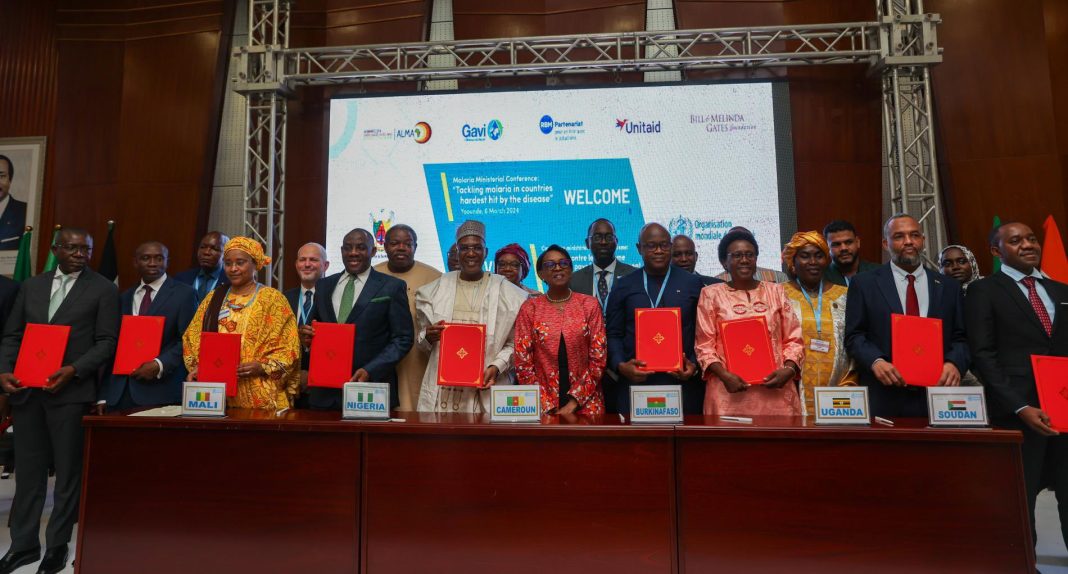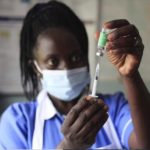Ministers of Health from African countries with the highest burden of malaria committed today to accelerated action to end deaths from the disease. They pledged to sustainably and equitably address the threat of malaria in the African region, which accounts for 95% of malaria deaths globally.
The Ministers, gathering in Yaoundé, Cameroon, signed a declaration committing to provide stronger leadership and increased domestic funding for malaria control programmes; to ensure further investment in data technology; to apply the latest technical guidance in malaria control and elimination; and to enhance malaria control efforts at the national and sub-national levels.
The Ministers further pledged to increase health sector investments to bolster infrastructure, personnel and programme implementation; to enhance multi-sectoral collaboration; and to build partnerships for funding, research and innovation. In signing the declaration, they expressed their “unwavering commitment to the accelerated reduction of malaria mortality” and “to hold each other and our countries accountable for the commitments outlined in this declaration.”
The Yaoundé conference, co-hosted by the World Health Organization (WHO) and the Government of Cameroon, gathered Ministers of Health, global malaria partners, funding agencies, scientists, civil society organizations and other principal malaria stakeholders.
The ministerial conference has four key aims: review progress and challenges in achieving the targets of the WHO global malaria strategy; discuss mitigation strategies and funding for malaria; agree on effective strategies and responses for accelerated malaria mortality reduction in Africa; and establish a roadmap for increased political commitment and societal engagement in malaria control, with a clear accountability mechanism.
“This declaration reflects our shared commitment as nations and partners to protect our people from the devastating consequences of malaria. We will work together to ensure that this commitment is translated into action and impact,” said Hon Manaouda Malachie, Minister for Health of Cameroon.
The African region is home to 11 countries that carry approximately 70% of the global burden of malaria: Burkina Faso, Cameroon, Democratic Republic of the Congo, Ghana, Mali, Mozambique, Niger, NIgeria, Sudan, Uganda and Tanzania. Progress against malaria has stalled in these high-burden African countries since 2017 due to factors including humanitarian crises, low access to and insufficient quality of health services, climate change, gender-related barriers, biological threats such as insecticide and drug resistance and global economic crises. Fragile health systems and critical gaps in data and surveillance have compounded the challenge.
Funding for malaria control globally is also inadequate. In 2022, $4.1 billion – just over half of the needed budget – was available for malaria response.
Globally the number of cases in 2022 was significantly higher than before the #Covid-19 pandemic, rising to 249 million from 233 million in 2019. In the same period, the African region saw an increase in cases from 218 million to 233 million. The region continues to shoulder the heaviest malaria burden, representing 94% of global malaria cases and 95% of global deaths, an estimated 580 000 deaths in 2022.
“Globally, the world has made significant progress against malaria in recent decades and yet, since 2017, that progress has stalled,” said Dr Tedros Adhanom Ghebreyesus, WHO Director-General. “The #Covid-19 pandemic and long-standing threats like drug and insecticide resistance pushed us further off-track, with critical gaps in funding and access to tools to prevent, diagnose and treat malaria. With political leadership, country ownership and the commitment of a broad coalition of partners, we can change this story for families and communities across Africa.”
To help accelerate efforts to reduce the malaria burden, WHO and the RBM Partnership to End Malaria launched the “High burden to high impact” approach in 2018, a targeted effort to accelerate progress in countries hardest hit by malaria.
The declaration signed at today’s conference is aligned with the “High burden to high impact” approach, which is founded on four pillars: political will to reduce malaria deaths; strategic information to drive impact; better guidance, policies and strategies; and a coordinated national malaria response.
“Malaria continues to cause preventable deaths in children and great devastation to families across our region. We welcome today’s ministerial declaration, which demonstrates a strong political will to reduce the burden of this deadly disease,” said Dr Matshidiso Moeti, WHO Regional Director for Africa. “With renewed urgency and commitment, we can accelerate progress towards a future free of malaria.”
To put malaria progress back on track, WHO recommends robust commitment to malaria responses at all levels, particularly in high-burden countries; greater domestic and international funding; science and data-driven malaria responses; urgent action on the health impacts of climate change; harnessing research and innovation; as well as strong partnerships for coordinated responses. WHO is also calling attention to the need to address delays in malaria programme implementation.








